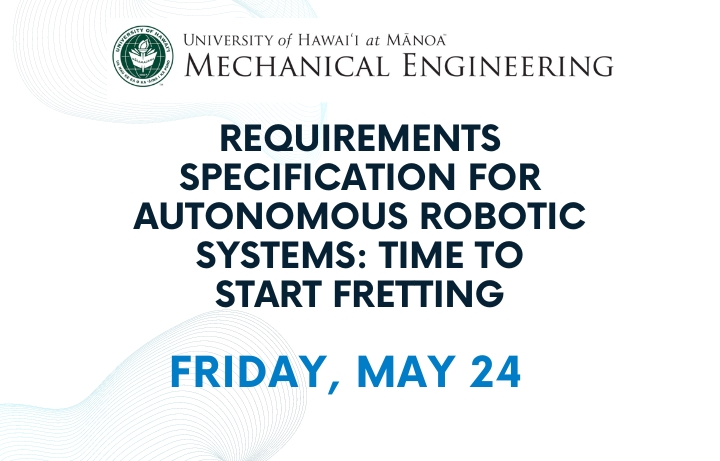
27 Jul 2024
Requirements Specification for Autonomous Robotic Systems: Time to Start FRETting
ABOUT EVENT

Join a UH Mānoa Mechanical Engineering seminar by Dr. Marie Farrell titled ‘Requirements Specification for Autonomous Robotic Systems: Time to Start FRETting‘ on Friday, May 24, 2024 from 3:00-4:00 pm in Holmes Hall 224. Please find more details below.
Contact meoffice@hawaii.edu for more information.
Abstract
The harsh environment, distances involved and communication issues surrounding space exploration make it both necessary and difficult to deploy autonomous robotic systems for these missions. However, to ensure the success of such expensive and mission-critical systems we need a fundamental step change in the way that these systems are verified and assessed. Formal methods, combined with testing and simulation-based approaches to verification, all play a role in analysing the robustness of these systems. But each of these techniques cannot be used effectively unless the requirements of the system are clearly and unambiguously defined. In fact, requirements specification for autonomous systems is an especially difficult part of the development process. This talk will provide an overview of our recent work on formalising requirements for space robotic systems and examining requirements for software that learns. It will also describe a suite of reusable robotic mission specification patterns that are formalised using NASA’s Formal Requirements Elicitation Tool (FRET).
About the Speaker

Marie Farrell is a Royal Academy of Engineering Research Fellow at the University of Manchester. Her focus is on “Strong Software Reliability for Autonomous Space Robotics”. This work aims to devise new ways of describing, analysing and assuring the autonomous behaviour of robotic space systems. Previously, she was a Senior Post-Doctoral Researcher in the Department of Computer Science at Maynooth University (VALU3S project). This work involved eliciting and verifying requirements for an aircraft engine controller. Before that, she worked on the EPSRC funded FAIR-SPACE Hub and participated in the RAIN and ORCA Hubs. This work focused on using and combining formal methods to reason about and provide certification evidence for robotic systems that are to be deployed in hazardous environments. She received her PhD from Maynooth University in 2017 for her work on defining a semantics, modularisation constructs and interoperability for the Event-B formal specification language using the theory of institutions. She is secretary of the working group developing the IEEE P7009 Standard on Fail-Safe Design of Autonomous and Semi-Autonomous Systems.
